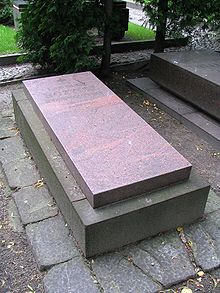Ludomir Różycki
Ludomir Różycki (born September 18, 1883 in Warsaw , † January 1, 1953 in Katowice ) was a Polish composer .
His father was a professor at the Warsaw Conservatory . Różycki studied composition with Alexander Noskowski. After completing his studies at the Warsaw Conservatory in 1904, he came to Berlin , where he studied with Engelbert Humperdinck for three years at the master school of the Royal University of Music in Berlin .
Together with Karol Szymanowski , Grzegorz Fitelberg and Apolinary Szeluto , he founded the “Publishing Society of Young Polish Composers” (Spółka Nakładowa Młodych Kompozytorów Polskich) in 1905, later called “Young Poland in Music”.
From 1907 to 1911 Różycki came to Lemberg, where he was appointed opera conductor and professor at the Lviv Conservatory. After a stay in Berlin, Różycki came to Warsaw in 1918, where he devoted himself exclusively to composition. In 1930 he was appointed professor at the Warsaw Academy of Music .
During the Second World War , Różycki's apartment burned down with unpublished works. Różycki settled in Katowice, where he held the post of Dean of the Faculty of Theory, Composition and Conducting at the University of Music.
Różycki's compositions are considered conservative. The best known is his ballet music Pan Twardowski (1921), which tells of the noble man who dedicated his soul to Satan and fled to the moon on the back of a rooster. The colorful, brilliantly orchestrated music offers the choreographer the opportunity to do many brilliant numbers. The libretto is based on the novel of the same name by Józef Ignacy Kraszewski .
His opera Eros und Psyche (Polish title: Eros i Psyche ) premiered in German in 1917 in Breslau and was particularly popular in the period between the two world wars. It was revived in Warsaw in 2017 - a hundred years after its premiere.
Motifs of Polish folk music are often noticeable in Różycki's works. The piano works show influences from Frédéric Chopin , Pjotr Ilyich Tchaikovsky and Johannes Brahms .
source
Individual evidence
- ↑ Karol Bula: Eros and Psyche. In: Piper's Encyclopedia of Musical Theater . Volume 5: Works. Piccinni - Spontini. Piper, Munich / Zurich 1994, ISBN 3-492-02415-7 , pp. 468-469.
- ^ Eros and Psyche: Teatr Wielki Opera Narodowa in the program of the Warsaw National Opera, accessed on May 15, 2018.
| personal data | |
|---|---|
| SURNAME | Różycki, Ludomir |
| BRIEF DESCRIPTION | Polish composer |
| DATE OF BIRTH | September 18, 1883 |
| PLACE OF BIRTH | Warsaw |
| DATE OF DEATH | January 1, 1953 |
| Place of death | Katowice |

